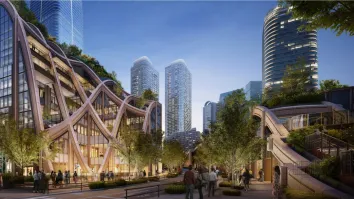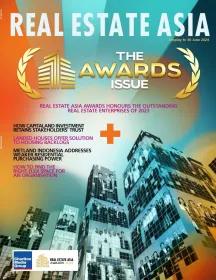
Singapore developers may shift focus to smaller plots of land with recent tax changes: KPMG
The government increased stamp duties for property buyers by 5-15 percentage points.
In recent months, property buyers in Singapore were slapped with higher additional buyer’s stamp duties, including duties of up to 35% for individuals and up to 40% for housing developers. The move could force developers to focus on projects in smaller plots of land. Could this be the end of mega-developments in Singapore?
Not quite, according to Teo Wee Hwee, Partner, Head of Real Estate & Asset Management, Tax of KPMG in Singapore.
Wee Hwee spoke with Real Estate Asia Editor-in-Chief Tim Charlton on the recent tax changes in Singapore and their impact on both buyers looking to settle in the country, as well as property developers.
What are some of the tax changes and regulatory changes that have happened in Singapore—and perhaps even since the 2022 budget was announced—that people need to be aware of?
There were a couple of tax changes that could potentially cause some concern to investors in the Singapore real estate space. First and foremost, there is the increase in the Additional Buyer's Stamp Duties (ABSD) as part of an extended cooling property measure previously announced a few months ago. It involves having the ABSD rates raised for certain classes of buyers from a range between 5 and 15 percentage points. This particularly impacts those who want to buy residential properties in Singapore since stamp duties could go up to 35% (or 40% for housing developers), which can be perceived as extremely hefty.
The other change is the property tax rate increase announced in the recent Budget. The top marginal rate will increase from 20% to 27%, starting on the first of January 2023 for all non-owner-occupied residential properties, followed by another increase from 27% to 36% with effect from the first of January 2024. There is also a similar increase for owner-occupied residential properties - less hefty – ranging from a top marginal rate of 16% to 23% from first January 2023, followed by a 23% to 32% increase in the following year.
Singapore has always been known as a jurisdiction with an attractive tax regime However, they are now really going for it in terms of the taxation increases. At what stage do you think investors think of other parts in Asia?
To be clear, Singapore residential investments will be impacted, not commercial ones. Purely from a stamp duty perspective, that can be pretty hefty compared with other countries. Singapore is still on par with countries like Hong Kong in terms of the punitive type of stamp duty rates but from a pricing perspective, there will still be a pretty big gap between Singapore and other top tier cities like Hong Kong, Beijing and Shanghai, for instance.
Do you think buyers just take the tax rates into consideration as part of the overall price of a property?
I think foreign investors and also foreigners who may want to move to Singapore and eventually become citizens will definitely look at the overall pricing. A lot of foreigners that come to Singapore still find Singapore’s residential properties quite competitively priced, even with the ABSD being factored in.
What do you think we can look forward to over the next few years? Do you have a sense of direction as to where the tax policies are going on Singapore properties?
Firstly, I suspect there could be some adjustments to the normal Buyer’s Stamp Duty that applies to anybody who buys a property in Singapore. Currently, anybody who buys properties will still have to pay normal stamp duties of up to 4%, on top of the ABSD that applies for certain individuals depending on the number of properties they are buying. The 4% is for properties valued in excess of $1m. That's kind of strange because whether you're buying a condominium or a good class bungalow, you're still just paying the normal standard of 4% on anything in excess of $1m. I think that's probably going to change as the government tries to tax more the wealthy people. There's still room to collect more stamp duty revenue from buyers of these super expensive properties by just simply increasing the normal Buyer’s Stamp Duty.
Singapore has been the REIT centre of Asia, but now other countries are trying to get in on that. Do you think Singapore is still the most competitive for REITs listings in Asia from a tax perspective?
Yes, I think Singapore is very attractive as a REIT listing location. What the appeal actually means to a sponsor listing a REIT depends on factors that may not be driven just purely from a tax perspective. As far as tax is concerned, the regime that we have now is already very attractive. But that's not really the main driving factor.
For anybody who wants to list their assets in Singapore, as opposed to listing it in their home country, it is really more about gaining international recognition through setting up a fund management platform in an international or regional hub. Increasingly, we see that it's not just about listing assets of one jurisdiction, but also about listing assets that are in the Pan-Asian region, for instance. For any clients or sponsors looking at a Pan-Asian portfolio or looking at injecting assets from outside the home country into the REIT platform, Singapore is the obvious choice.
Is there anything else you want to add or any other insights you want to let us know?
In terms of the impact of ABSD increase on developers, my view is that developers may start to go for smaller plot sizes with fewer units, rather than buying a big plot of land where they have over 1,000 units to sell because it's just harder to sell more properties within that short period of time. Part of the issue with ABSD is you need to go for a remission from the IRAS. If you cannot sell your properties within the first five years, then the remission is no longer available. This means that you would instead have to pay the ABSD that was initially waived when you first developed the property. Obviously, the more units you have, the harder it will be for you to sell. The risk of not being able to sell all those units is going to be higher. With the increase in ABSD, my view is that while more developers will still continue to develop properties for sale, they are likely to go for a smaller plot land with fewer units for sale.
Could we have seen the end of Singapore's mega condo developments for the time being?
I would not say it is the end, but the focus might shift to smaller plots. As we speak, there is still an undersupply of homes in Singapore and this is not surprising due to COVID-19. I think developers are still going to bid for land, but probably, they may not be that focused on the bigger plots of land.
















 Advertise
Advertise


